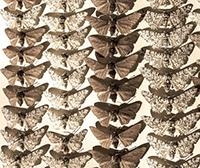
Wild Films ~ Unnatural Selection
- Library Hall
Winner! The Best Environmental Film at the 2016 International Wildlife Film Festival!
It has taken billions of years for life to evolve into the extraordinary diversity of creatures we see today. But humans have re-shaped vast swathes of the planet and in so doing have altered the course of evolution. The extreme pressures created by human landscapes have sped up evolution and sent it in unexpected directions.
Animals, over millions of years, slowly adapt to their environments. A gradual process, it was thought. But we now know that evolution can proceed at a much faster pace. This is ‘unnatural selection’, an accelerated version of evolution where humans accidentally – or purposefully – hijack the environment, inadvertently manipulating the animals that survive. And we are only just beginning to document the results.
Humans have changed animals – and plants – ever since the dawn of farming. But many of our activities are changing the animals around us in remarkable and unexpected ways. The evolution of drug-resistant bacteria and pesticide-resistant insects are well known but the more scientists look, the more examples they find. Humans are everywhere, affecting most of the planet. And we create pressures that are so intense that human-induced evolution is actually ‘accelerated’ evolution.
And it can happen right before our eyes.
A cichlid fish introduced into Lake Malawi formed a new species in just 30 years. Here is the clearest rebuff to creationists and proponents of intelligent design – human-induced evolution is happening on timescales we can see and measure.
Accelerated evolution is seen everywhere. Birds in cities are now changing their singing patterns. It’s often so noisy during the day that many are switching to singing at night. And birds like Great tits are changing their songs, singing at a higher frequency to penetrate the low bass rumble of traffic. Some scientists suggest that in 50 years time, the dawn chorus could have raised an octave and be much higher pitched. In the ocean, fishing pressure on big fish has changed the lifecycle of cod; they now mature and breed at much smaller sizes.
Similarly, some Pacific salmon now grow to just 2/3 of their previous size. Yet a kind of hermit crab on America’s east coast now grows larger to fit into the shells of a large snail that has recently been introduced.
What all these examples show is how fast major evolutionary changes can happen. This is coming in handy for creationist critics and also reveals details of the evolutionary process as never before. These changes represent a new environmental challenge for the 21st century, yet one that has hardly yet been considered.
Run time: 60 min.
WILD FILMS AT THE LIBRARY is a free series of award-winning international wildlife films selected from the International Wildlife Film Festival. The International Wildlife Film Festival was established in 1977 in Missoula, Montana with a mission to promote awareness, knowledge and unde.rstanding of wildlife, habitat, people and nature through excellence in film, television and other media.
Made possible by Terra Mater Factual Studios














